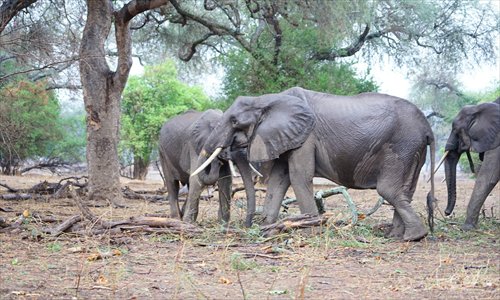
A herd of elephants walk in the Mana Pools National Park, Zimbabwe. (Photo: Courtesy of BSR)
A Chinese NGO which has become famous for its disaster relief work has started to move into the world of wildlife conservation. In an effort to raise Chinese domestic awareness and improve the country's image abroad, they have started an anti-poaching project in Zimbabwe. Despite resistance from local NGOs, they have pledged to carry on and find new ways for Chinese NGOs to go global.
Blue Sky Rescue (BSR), an NGO, has helped save people after natural disasters in China, Myanmar and Nepal. But their latest effort involves saving the natural environment from people, when they sent a team to Zimbabwe to contribute to anti-poaching work in the southern African country.
In May, their first batch of five volunteers, including three retired special forces soldiers, arrived in Zimbabwe, along with equipment such as boats, vehicles, firearms, medicines and a drone.
"The motivation for us to launch the project first came from our regret about how small the Chinese presence was in these efforts and our bad reputation for wildlife conservation abroad," Wang Yingjie, one of the people behind the project and BSR's public relations director, told the Global Times in a recent interview in Beijing.
China is a major market for the products of wildlife poaching and trafficking in Africa, due to demand for ornamental ivory, delicacies, items that are seen as medicinal, and live animals for zoos.
In October, a Chinese businesswoman, dubbed the "Ivory Queen," was charged with smuggling nearly 1.9 tons of ivory worth millions of dollars from Tanzania to China between 2000 and 2014.
"We want to get involved in conservation so as to help raise people's awareness of wildlife protection back in China. What's more, we want to make an effort to share the responsibility and improve China's image," noted Wang, who spent 20 days in Zimbabwe in November.
"Non-governmental charity work is an effective way to enhance national feelings and mend relations," he added.
But their mission was met with mistrust and even resistance. Some locals saw their weapons and assumed that they were using anti-poaching patrols as a cover for poaching, and some NGOs worried that their funding might be affected, he explained.
There are a lot of NGOs engaging in wildlife conservation and anti-poaching activities in Africa and many of them are backed by Western charities. Each year, millions of dollars go to that sector.
"Some people are not happy to see the Chinese becoming conservationists, as they worry that Chinese involvement might threaten their chance to gain attention and charity funds," Wang noted.
Pioneering project
With the help of the Chinese Foreign Ministry, BSR reached an agreement in February with Zimbabwe's Ministry of Environment, Water and Climate to conduct their anti-poaching program.
Wang Yingjie gave three reasons why they chose to cooperate with Zimbabwe first: the Zimbabweans are "mild," the country has a good relationship with China, it is politically "stable" and its abundant intangible cultural and natural heritage is in critical need of conservation.
Li Chun, 28, a registered member of BSR with a first aid certificate and experience of drone flying, was among the first batch of volunteers that set out for Zimbabwe on May 22. "When I heard the call, I immediately applied to go," Li, a resident of Suzhou, East China's Jiangsu Province, told the Global Times.
BSR, established in 2007, has more than 30,000 registered members across China, including 1,000 who have obtained special rescue or first aid certificates.
The areas of Zimbabwe in which BSR mainly operate were Hwange, Matusadona, and Mana Pools national parks. By working with park authority officers, they patrolled the parks nearly every day, armed with shotguns.


















































